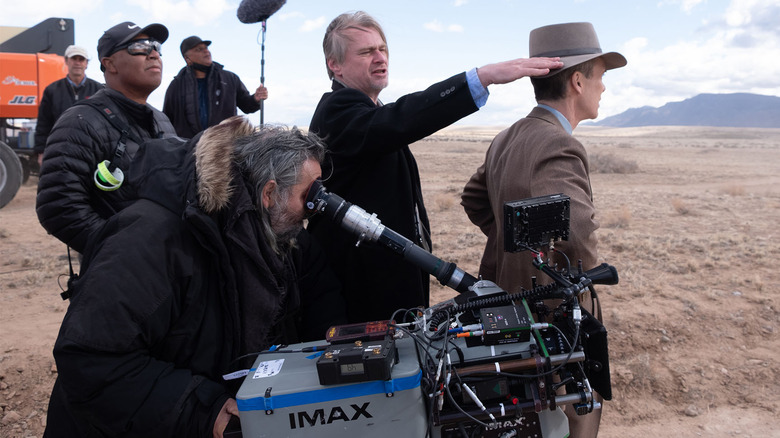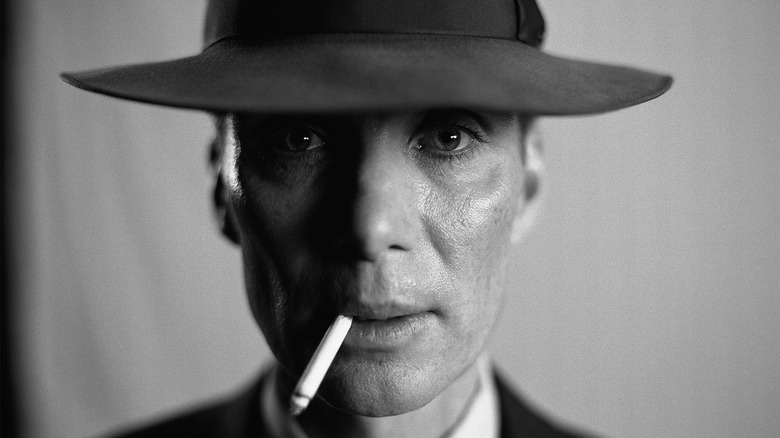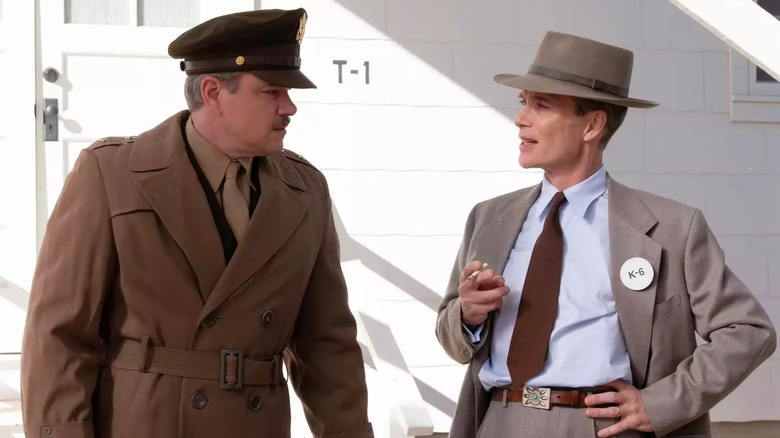J. Robert Oppenheimer's Grandson Had One Worry After Visiting The Los Alamos Set
Christopher Nolan might have been outdone at the box office by "Barbie" and her $1 billion, but the director deserves credit for bringing hordes to the multiplex to watch a drama in 2023. Nolan's adaptation of Kai Bird and Martin J. Sherwin's Pulitzer-winning J. Robert Oppenheimer biography "American Prometheus" has enraptured viewers with its sobering look at the titular physicist's development of the atomic bomb. And for the esteemed filmmaker, one of the most important elements, when it came to drawing people in, was putting audiences in the moments before the infamous 1945 Trinity Test, when the bomb was first tested.
Nolan has spoken about how compelling he found the fact that Oppenheimer and his colleagues couldn't be sure they wouldn't destroy the world the first time they hit the detonator. Unfortunately, or fortunately, depending on how you look at it, Oppenheimer's chances of igniting the atmosphere were pretty much non-existent, which is just one of several historical facts that "Oppenheimer" ignores, overlooks, or adapts to fit Nolan's vision.
Thankfully, the historical record of Oppenheimer's life and work is actually quite well established, thanks in part to books such as Bird and Sherwin's. That means we can test Nolan's script against reality pretty easily. On top of that, there's the fact that Oppenheimer is a relatively recent figure in history, which means there are plenty of people who remember the man himself still knocking around. His son Peter is just one example, and it seems Nolan's deviations from his father's life haven't entirely evaded him, or his own son, Charles Oppenheimer, who evidently has some thoughts of his own.
'He would never, ever do that'
Another historical occurrence portrayed somewhat inaccurately in "Oppenheimer" is the infamous apple incident. In the film, Oppie poisons an apple with cyanide and leaves it on the desk of his Cambridge supervisor, Patrick Blackett, in a perverse attempt at revenge for being made to look foolish during Blackett's class. He then has the first of many crises of conscience and rushes to remove the apple before Blackett can take a bite.
But the reality is much more murky. Perhaps unsurprisingly, Oppenheimer's grandson wasn't too thrilled about the apple incident being included in Nolan's biopic. Charles Oppenheimer, whose father Peter grew up at Los Alamos while the Manhattan Project unfolded, spoke to TIME following the movie's release, and said that he "definitely would have removed the apple thing" and that "if you read 'American Prometheus' carefully enough, the authors say, 'We don't really know if it happened.' There's no record of him trying to kill somebody."
But that wasn't the only element Charles Oppenheimer probably would have nixed in "Oppenheimer." When asked if there was anything he "would have advised [the production crew] to do differently," he recalled visiting the set twice, adding:
"I saw them film and, in that particular scene, Cillian Murphy walks into a room and part of his line was calling someone an 'a*****e.' And when I went back to Santa Fe and told my dad, he was horrified. He said, 'Robert Oppenheimer never swore. He was such a formal person. He would never, ever do that.' And I was like, 'Well, it's a dramatization.' But I was worried that in the movie he would be this swearing, abusive guy. Anyway, I think he said one swear word in the movie and I just happened to be in the room."
J. Robert Oppenheimer vs. Oppenheimer
It's worth noting that for all the creative license Christopher Nolan took with "Oppenheimer," Charles Oppenheimer still seemed to like the final product. As he told TIME, "I found myself accepting and liking it. I thought it told a compelling story and I could just take it as art that was really engaging. I was really happy to have that reaction. I didn't expect it." Still, it's clear that the man Charles knew and the version portrayed by Cillian Murphy (whose dedication to prepping for the role can't be questioned) are very different people.
That's something Richard Brody focused on in his New Yorker review, which takes Nolan to task for creating what Brody sees as a "History Channel movie with fancy editing." Which is a fairly reductive view taken in isolation, but Brody has some insightful points, such as when he writes:
"The film is so intent on making Oppenheimer an icon of conflicted conscience that it pays little attention to his character over all. He was a renowned aesthete with a bearing so charismatic that his students would try to emulate it, but we get little more than a couple of artsy name-drops to suggest that he has any cultural life at all."
That's interesting in light of Charles and Peter Oppenheimer's comments, which combined with Brody's insights suggest the version of Oppie depicted in Nolan's film is a much more one-dimensional figure than the man himself. Perhaps that's why Charles told TIME that, had he and his father been consultants on the movie, they "could have added some details and depth." Still, as Charles put it, the director was still able to "tell the story he intended to." And that story certainly seems to have resonated with audiences thus far.


